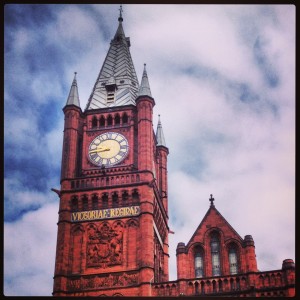One of the inspiring things about Tristram Hunt’s book [amazon_link id=”075381983X” target=”_blank” ]Building Jerusalem: The Rise and Fall of the Victorian City[/amazon_link] is reading about the energy and optimism of leading citizens in the newly industrialising cities.
[amazon_image id=”075381983X” link=”true” target=”_blank” size=”medium” ]Building Jerusalem: The Rise and Fall of the Victorian City[/amazon_image]
It was an era when Britain’s cities other than London, for all the misery and squalor of the working classes, had a sense of control over their own destiny. I do agree with Hunt when he says in the Introduction: “[T]he policies of successive British governments have served to castrate civic autonomy. Unintelligible and ideas-free history [of urban growth] has gone hand in hand with rate-capping, surcharging and centralisation to render local government and civic pride a forlorn part of the historical landscape.”
He points out that Lord Palmerston defended the grand designs for a new Foreign Office building in Whitehall on the basis that it could not be less impressive than Leeds Town Hall. The unpleasant John Ruskin criticised the ugliness of the northern cities – as apparently Peter Hall did too – but it would surely require mental blinkers not to appreciate the glory of Manchester Town Hall or St George’s Hall in Liverpool, or the streets of handsome warehouses in any of the Victorian industrial centres. Hunt writes: “Britain was a land of great cities, each one playing a part in the political process and preventing the unstable accumulation of too much power in the capital.” Commentators at the time contrasted Britain’s stability favourably with the continuing upheaval in over-centralised France.
It is a weakness of the British economy now that it runs on only one engine, albeit a super-sized one, in London. Nobody sensible wants to see London weakened, but surely everybody sensible would like to see other cities have the capacity to grow faster than they have for the past 50 years or more. When people talk about the desirability of rebalancing the economy so that manufacturing and exports grow faster than financial and other services, that’s equivalent to hoping for faster growth in the industrial centres outside the south east, because that’s where most of the manufacturing is located. Economies are not abstractions, they consist of people in places.
I was involved in the Manchester Independent Economic Review, looking at how the city could regain some of that Victorian dynamism, which requires regaining a stronger voice over some of the influences on growth, such as transport and other infrastructure links, planning (an area where the issues in south and north are entirely different), and skills.
It’s a slow process achieving these things, though. Not only is the centre naturally unwilling to cede any decision-making territory, there is also the tyranny of the so-called ‘postcode lottery’. Still, the experience of the devolved nations suggest it is possible to come to terms with difference, so I think it is worthwhile looking for inspiration in the Victorian cities.

Victoriana
